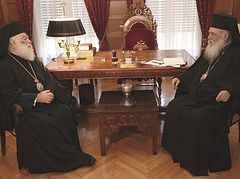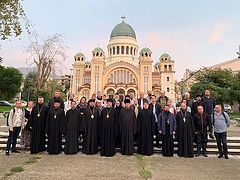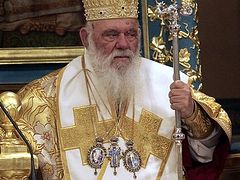Moscow, November 19, 2019
 Photo: interfax-religion.ru A series of pickets took place outside the Greek and Turkish embassies in Moscow today, concerning the Greek Church’s recent recognition of the schismatic “Orthodox Church of Ukraine.”
Photo: interfax-religion.ru A series of pickets took place outside the Greek and Turkish embassies in Moscow today, concerning the Greek Church’s recent recognition of the schismatic “Orthodox Church of Ukraine.”
The pickets began yesterday afternoon outside the Greek Embassy against the hierarchs who support the OCU and the “Greek state that manipulates them,” reports Interfax-Religion.
The demonstration comes in the wake of both Archbishop Ieronymos of Athens and Patriarch Theodoros of Alexandria officially recognizing the Ukrainian schismatics over the past month.
Participants in the rally held a poster with the words, “Thus they sell the faith,” written in both Greek and Russian. The poster showed Greek Prime Minister Kyriakos Mitsotakis standing on a rickety stool labeled, “US Democratic Party,” with Pat. Theodoros and Abp. Ieronymos in his hands as dolls. Above his head, the poster reads, “EU.”
“There is much evidence that the uncanonical and immoral decisions of Patriarch Theodoros of Alexandria and Archbishop Ieronymos of Athens were made not without the influence of the Greek authorities, which today have an Atlantic vector. It is known that Athens is under the strict financial and economic control of Brussels, and the point of support for them are the American Democrats, among whom there is a strong Greek ethnolobby,” said one of the participants Archpriest Vsevolod Chaplin, rector of the Church of St. Theodore the Studite, which is located in the immediate vicinity of the Greek Embassy.
The Russian Church needs to move from compromises to conversations, Fr. Vsevolod believes, especially since they “have come across absolute dishonor on the part of some Church and political figures of the Greek world.”
“You can talk to the Greek people on top of their elites, talk to the conservative popular majority, with those people who now do not allow Ukrainian dissenters in Greek churches, despite the position of the hierarchical system, with those pastors, theologians, monks, bishops who do not follow the path of renovationism in favor of the God-fighting elites of Brussels and Washington. The Greek establishment, secular and religious, has deceived us and its own people many times,” Fr. Vsevolod concluded.
Picketing continued later in the day at the Turkish Embassy, with participants holding posters that read, “Turkey, why do you need Greek Russophobes?”
At that event, Fr. Vsevolod recalled that Christianity arose from the Jews, not the Greeks, and highlighted the novelty of Constantinople’s theory of a special character of the Greek people that gives them a place of prominence in the Church over the Slavic peoples. “This, of course, is a very strange new teaching,” he remarked.
Last October, Patriarch Bartholomew stated, “Whether our Russian brothers like it or not, sooner or later, they will follow the decisions of the Ecumenical Patriarch, because they have no other choice… Our Slavic brothers cannot tolerate the primacy of the Ecumenical Patriarchate and our nation in Orthodoxy.”
Several hierarchs of the Greek Church, including Metropolitan Chrysostomos of Dodoni, openly argued that they have to agree with Constantinople’s actions in Ukraine in order to stand with the Greeks rather than the Russians.
Fr. Vsevolod also noted that in the territory of modern Turkey, the Orthodox flock consists mostly of people of Turkic and Slavic origin—mostly immigrants from the countries of the former USSR.
In conclusion, on behalf of the participants in the pickets, Fr. Vsevolod asked, “Why should Turkey, a very strong country friendly to us, which has every right to conduct an independent policy, have such a fifth column of Atlantean forces playing the productions of Brussels and Washington, especially since the Orthodox flock of Turkey has nothing to do with these forces?”




